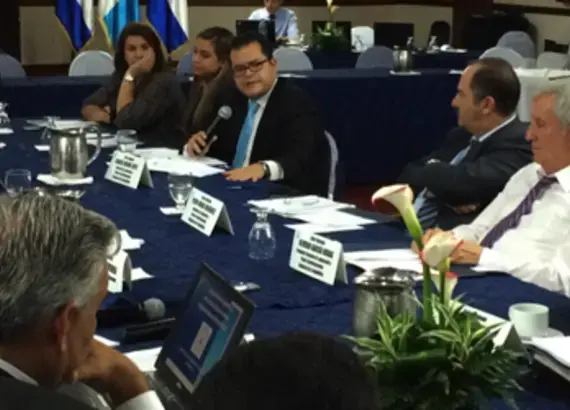
Success Story
Central American Legislators Promote a Regional Approach for Security Policy
In recent years, countries in the “northern triangle” of Central America have confronted a startling increase in homicides, violence and insecurity due mainly to rising gang violence, drug trafficking and crime. Though governments in El Salvador, Guatemala and Honduras are attempting to reduce violence and address its root causes, they often adopt separate policies rather than devising a single, unified approach for the region. But since the gangs and cartels that fuel violence are multinational entities with cross-border operations, cooperation among governments is key to combating the problem.
In 2011, Central American governments reached a regional consensus on intergovernmental coordination strategy to combat violence, but coordination remains inadequate. While the agreement, known as the Central American Integration System, provides a framework for cooperation, regional governments still have not drafted legislation to implement it fully. Civil society organizations across the region have proposed model legislation, but national legislatures have been slow to adapt the laws to match regional agreements.
To help policymakers create a cross-border approach, NDI co-organized an ongoing series of Interparliamentary Forums on Security and Violence Prevention Policies in January 2013 with support from the National Endowment for Democracy and the United States Agency for International Development. The next one will convene next summer in Tegucigalpa, Honduras, where participants will revisit the analysis and discuss advances made by each country since the previous forum held Guatemala City on July 25. With the help of the analysis, legislators will draft policy agreements and advocate for their passage in their respective chambers.
The July forum focused specifically on harmonizing regulations in each country that determine criminal offenses and penalties related to organized crime, including corruption, illicit enrichment, money laundering, and human, drug, organ and sex trafficking. Three legislators each from Honduras and El Salvador met with four of their Guatemalan counterparts, all of whom serve on congressional committees responsible for addressing security issues. Representatives also attended from the Guatemalan Working Group on Security and Justice, which includes members from the Guatemalan Congress, International Commission Against Impunity in Guatemala, Ministry of National Defense, Human Rights Ombudsman, Vice President’s Office, United States Embassy and NDI, among others.
The president of the Congress of Guatemala and the president of the Committee on Legislation and Constitutional Affairs delivered introductory remarks, stressing the importance of congressional action and a uniform approach to address security issues. NDI’s resident director in Guatemala, Eduardo Nuñez, also delivered a presentation on the role of political party members and legislators in combating crime and improving citizen security. Public presentations and panel discussions focused on the obstacles faced by each government, including the need for a comprehensive political, social and economic approach to address violence, gaining public support for effective policies and interagency coordination. During a private discussion, legislators talked about establishing a permanent interparliamentary body to deliberate policy they could amend to make their security laws more uniform, including those related to corruption, arms sales and trafficking, and money laundering.
In an effort to develop concrete proposals and commitments from each government, legislators from each country agreed to compile a comparative analysis detailing their current criminal offense and punishment laws, including identifying which portions of those laws could be modified to create a unified approach.
NDI, with support from the National Endowment for Democracy, began working in 2010 with public officials, political parties and civil society organizations in Guatemala, Honduras and El Salvador to improve citizen security in the region by supporting the development and implementation of sustainable local violence prevention initiatives.
Read more:
Published: Nov. 26, 2014
